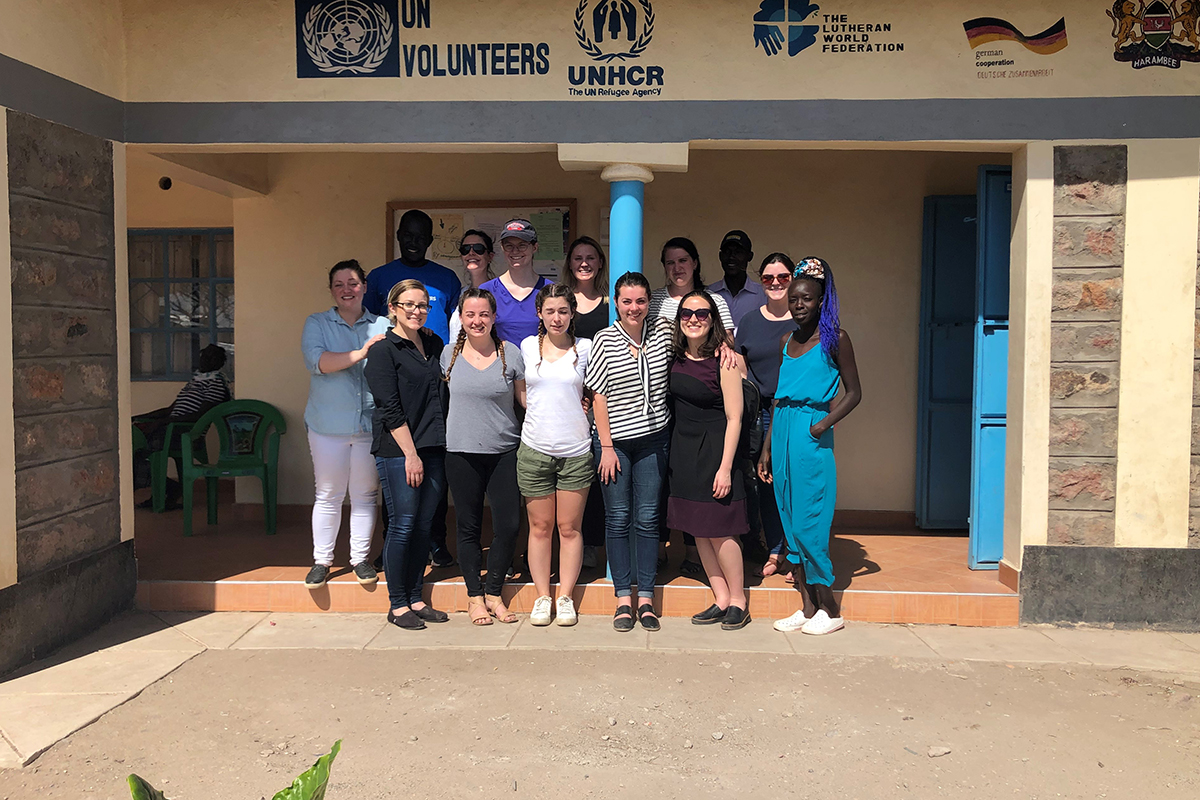 Following their trip to Kenya, the law students are now preparing an individual complaint which will be submitted to the African Commission on Human and People’s Rights, a quasi-judicial body that works to promote and protect human and collective peoples’ rights throughout the continent. (Image courtesy of Elisabeth Ward)
Following their trip to Kenya, the law students are now preparing an individual complaint which will be submitted to the African Commission on Human and People’s Rights, a quasi-judicial body that works to promote and protect human and collective peoples’ rights throughout the continent. (Image courtesy of Elisabeth Ward)
Earlier this year, 11 students from the College of Law, enrolled in the International Human Rights Law Practicum, traveled to Kakuma, Kenya. The students engaged in a traditional human rights documentation and analysis project, and collected testimonies from Anuak refugees living in the Kakuma Refugee camp and Kalobeyei Integrated Settlement. The law students are now preparing an individual complaint which will be submitted to the African Commission on Human and People’s Rights, a quasi-judicial body that works to promote and protect human and collective peoples’ rights throughout the continent.
“These experiences are not only beneficial for our students, but also serve communities of people that feel completely ignored by the international community,” says Elisabeth Ward, executive director of the IHRLI and professor of the IHRLP. “Nearly every person we interviewed said they’ve been forgotten and feel abandoned. We are seeking some sense of justice for these victims.”
The Anuak people are an ethnic group from the Gambella region of Ethiopia. In 2003, the Ethiopian state military and another ethnic group, called the Highlanders, committed a massacre against the Anuak. They came into villages across the Gambella region - primarily dominated by the Anuak – and killed the men, committed acts of sexual- and gender-based violence against the women, and burned down the villages.
Following the massacre, the Anuak were pushed out of the Gambela region. Some immigrated to a refugee camp in South Sudan, but eventually were pushed to the Dadaab camp in northern Kenya. In 2017, the Kenya government shut down that camp, and the refugees were moved to the KKIS. With a mix of various nationalities and ethnicities, the refugee camp has become so big it now is classified as a settlement, totaling 186,692 registered refugees in November 2018.
“In the 16 years that have passed since the massacre, the Ethiopian state has failed to acknowledge its occurrence and the international community has done little to address the atrocities committed,” Ward says.
During their visit, Ward and her students collected testimonies from 18 Anuak women who were victims of sexual violence. Most of the women had never discussed until the interview with DePaul students. One of the main priorities of the project was to ensure the testimonies were gathered according to international best practices and prevented re-traumatization. With this goal in mind, the students were required to complete an intensive 3-day training focused on conducting field interviews of victims of sexual and gender based violence.
Throughout the spring, the students will continue to draft the complaint in hopes of overcoming procedural hurdles, which prevented a 2006 complaint from reaching the merits phase.
Though the IHRLP is only one academic year long, Ward expects she will continue this project for the 2019-20 practicum, noting the impact this particular project has had on her and the students involved.
“There’s always going to be a question about the utility of studying a field like human rights law or international criminal law in law school,” Ward says. “But the impact these types of experiences have on our law students is a reason many students choose the DePaul College of Law. They want to see our Vincentian mission in action. They want to better understand how they can promote human rights with their J.D. What a better way of doing that, than providing access to justice, to a group of persons who have experienced intense trauma and feel abandoned by the international community. In addition to the social justice aspect of the IHRLP, students are honing their research, oration and writing skills in an international setting. This is a rare opportunity at any law school in the US. I am so proud to be a part of an institution which prioritizes programs and experiences like this.”